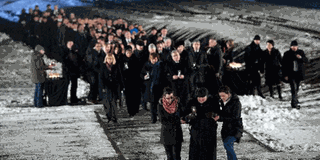Alarm as one in 20 Britons deny genocide of Jews ever happened

People walk in a procession to light candles on a memorial for the victims after the main ceremony to mark the 70th anniversary of the liberation of the death camp on January 27, 2015 at the former Nazi concentration camp Auschwitz-Birkenau in Oswiecim, Poland. PHOTO | ALAIN JOCARD | AFP
What you need to know:
For the Holocaust deniers, officials of the Holocaust Memorial Day Trust which organised the poll, said the negative respondents were not all necessarily anti-Semitic but were ignorant of history.
The Holocaust is taught in schools, but “that might only be one lesson,” said Olivia Marks-Woldman of the Trust.
Six million men, women and children died when the Nazi party of Germany sought to wipe out Europe’s Jews, and it happened in the lifetime of many people alive today. Yet a recent poll showed that one in 20 British adults do not believe that the Holocaust, as it is known, ever happened.
Worse, new figures show a surge of hate attacks on Jewish targets is the biggest on record — 1,652 incidents in the latest 12-month period, a rise of 16 per cent. The commonest form of attack was random verbal abuse of Jewish people in public, but there were also 123 violent assaults and 78 attempts to damage or desecrate Jewish property. Campaigns on social media have been linked to the rise and some Jewish schools now employ security guards.
IGNORANCE
The opposition Labour party has faced persistent accusations of harbouring anti-Semitism and party leader Jeremy Corbyn has been accused of failing to crack down on offenders. David Delew, chief of the Community Security Trust which compiled the figures, noted that the latest total was a record high for the third year running. As for the Holocaust deniers, officials of the Holocaust Memorial Day Trust which organised the poll, said the negative respondents were not all necessarily anti-Semitic but were ignorant of history. The Holocaust is taught in schools, but “that might only be one lesson,” said Olivia Marks-Woldman of the Trust. “And people who are middle-aged or over may never have been taught about it.”
One teacher said that after he discovered widespread disbelief of the Holocaust in his high school class, he played a famous documentary film about the death camps, Alain Resnais’s Night and Fog. Afterwards, the strongest denier changed his mind and several girls wept and asked how they could spread the message about the genocide. The British poll echoed the findings of a survey carried out in seven European countries last November. That investigation found that one in three people knew little or nothing about the killing of Jews. In France, 20 per cent of those aged 18-34 said they had never heard of the Holocaust, yet some 73,000 French Jews were deported and murdered between 1940 and 1944.
* * *
The BBC has been trying to decide who is the greatest person of the 20th century, which prompts the reaction, how could you possibly tell? Well, of course, you couldn’t, but the TV people decided to offer leading contenders for consideration and debate, then put the choice to a popular vote. Programmes over several weeks examined candidates in seven fields: politics, exploration, science, entertainment, activism, art and sports. Argument and promotion by well-known experts produced these finalists: Nelson Mandela, Antarctic explorer Ernest Shackleton, the father of computing Alan Turing, singer David Bowie, Martin Luther King, artist Pablo Picasso and Muhammed Ali.
Thus, three Brits, two Americans, a Spaniard and a South African; three blacks and four whites; no women. I was pretty sure Mandela would win, or maybe Martin Luther King. But when viewers’ votes were counted, the title went to Alan Turing, the genius who broke the Nazis’ Enigma code during World War Two. Perhaps viewers felt sorry for him. Turing was persecuted for his homosexuality, illegal at the time, and was found dead next to a half-eaten apple laced with cyanide.
* * *
There’s an old saying here, “Beer before wine and you will feel fine; wine before beer and you’ll feel queer.” Wrong!
Dr Kai Hensei of Cambridge University gave alcohol in various combinations to volunteers and the results next day were nausea, tiredness, thirst and headaches, no matter what you drank and in which order. Said Dr Hensei, “We found there was no way to avoid the inevitable hangover just by favouring one order of drinks over another.”
* * *
When police were called to an accident near South Milton, Devon, the driver said he had swerved to avoid an octopus on the road. Octopuses are not unheard of in the seas off Devon but this one would have had to crawl more than five kilometres over hills and fields to find itself on the A381.
The man was arrested on suspicion of driving under the influence of drugs.





